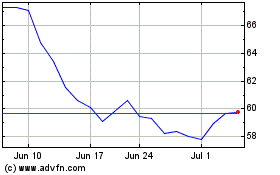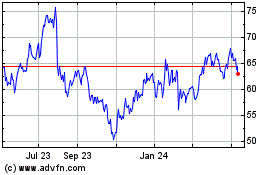By Mengqi Sun and Mark Maurer
The Securities and Exchange Commission is increasingly
questioning public companies about compliance with U.S. sanctions
as the nation's blacklist of individuals and entities grows.
The regulator has slowly ramped up comment letters to companies
seeking more details about disclosures related to dealings in
countries targeted by U.S. sanctions, according to a Wall Street
Journal analysis of regulatory filings and data compiled by
consulting firm Audit Analytics Inc.
At least 42 companies received letters from the SEC last year
regarding activity in areas subject to sanctions enforced by the
Treasury Department's Office of Foreign Assets Control. That
matches the 2017 total, which is up from an average of about 33
during the three years ending in 2016, according to Audit
Analytics.
In recent months, the SEC has sent letters to companies such as
PayPal Holdings Inc., Bank of New York Mellon Corp. and Chinese
travel-services provider Ctrip.com International Ltd. with
sanctions-related questions.
The SEC doesn't play an active role in penalizing companies for
potential sanctions violations, but it does police companies'
disclosures to ensure adequate reporting on business risks, said
Scott Flicker, a partner at law firm Paul Hastings LLP in
Washington, D.C.
"Companies make disclosures when they deem that information
would be material for investment decisions, by current or potential
investors," Mr. Flicker said. "Financial materiality is an
important touchstone for disclosure, but it's not the only
one."
The SEC regularly sends comment letters to companies with
questions about disclosures made in securities filings. The letters
usually focus on accounting practices, and can result in additional
disclosures in future filings, revisions to previously filed
disclosures, or a simple response with extra details that help the
SEC better understand a disclosure. The back-and-forth between a
company and the SEC stops once the regulator deems the matter
resolved. The letters are typically made public about 20 days after
a matter is resolved.
Sanctions-related letters comprise just a fraction of the SEC's
comment letters, but the proportion of companies receiving them
grew from 1.5% in 2014 to 4.5% in 2018, according to Audit
Analytics. "They're interested in any possible violation of trade
restrictions," said Don Whalen, the firm's director of research.
"They probably want to make sure sanctions being placed on the
countries are actually being honored."
The uptick coincides with a surge in U.S. sanctions, which have
been used by the Trump administration to increase pressure on
geopolitical issues or target suspected criminal behavior.
In 2018, almost 1,500 individuals or entities were added to the
designation list, according to data compiled by Adam M. Smith, a
partner at law firm Gibson, Dunn & Crutcher LLP. That is more
than twice the annual average over the previous 10 years.
BNY Mellon declined to comment on its SEC correspondence.
Ctrip.com didn't respond to a request for comment.
PayPal, the San Jose, Calif.-based financial technology company,
received a comment letter in July about its 2018 annual report, in
which PayPal disclosed that it self-reported to OFAC suspicious
transactions that might have violated U.S. sanctions.
The SEC asked PayPal to detail the countries related to the
transactions and the extent of the company's contact with the
countries. The regulator also asked PayPal to specify whether those
contacts posed a material risk to investors. The correspondence was
made public last week.
The SEC declined to comment beyond the letters.
The SEC said in its letters to PayPal that many investors,
particularly institutional investors, have proposed divestments
from companies that do business with U.S.-designated state sponsors
of terrorism, and that PayPal should address the potential impact
on the investor sentiment, including reputational harm.
Aaron Anderson, PayPal's chief accounting officer, responded to
the SEC, writing that the transactions in question, which occurred
between 2013 and 2016, were related to North Korea, Iran, Sudan and
Syria -- countries that were under U.S. sanctions at the time of
processing. He said in the letter that the revenue from the
transactions and their volume were negligible to the company and
that OFAC hasn't made a decision about whether it would treat the
flagged transactions as potential violations, according to the
response sent to the SEC by the company.
A Treasury Department spokeswoman declined to comment, saying
the department doesn't speculate on possible sanctions violations
or comment on possible or pending investigations.
"PayPal makes every effort to comply with laws and regulations
in the markets where we do business around the world," a company
spokesman said in an email for this article. "As exhibited by the
company's track record of self-reporting and work to satisfy
clarifying questions posed by the SEC, PayPal takes its regulatory
and compliance obligations seriously."
The regulator and the company had a similar exchange in 2016
related to disclosures in PayPal's 2015 annual report, in which the
company said it paid $7.7 million to OFAC in March 2015 to settle
allegations that it processed transactions worth about $44,000
between 2009 and 2013 and had continued to cooperate with OFAC on
additional self-reported transactions.
The SEC is looking closely at potential security risks,
particularly those related to money-transfer and peer-to-peer
payment businesses, said Moshe Katri, an analyst at Wedbush
Securities Inc. who follows PayPal.
"These are risks that come when you're processing billions of
transactions," Mr. Katri said. "This is going to be a consistent
pain point for all of these companies."
Write to Mengqi Sun at mengqi.sun@wsj.com and Mark Maurer at
mark.maurer@wsj.com
(END) Dow Jones Newswires
August 28, 2019 15:05 ET (19:05 GMT)
Copyright (c) 2019 Dow Jones & Company, Inc.
PayPal (NASDAQ:PYPL)
Historical Stock Chart
From Mar 2024 to Apr 2024

PayPal (NASDAQ:PYPL)
Historical Stock Chart
From Apr 2023 to Apr 2024
